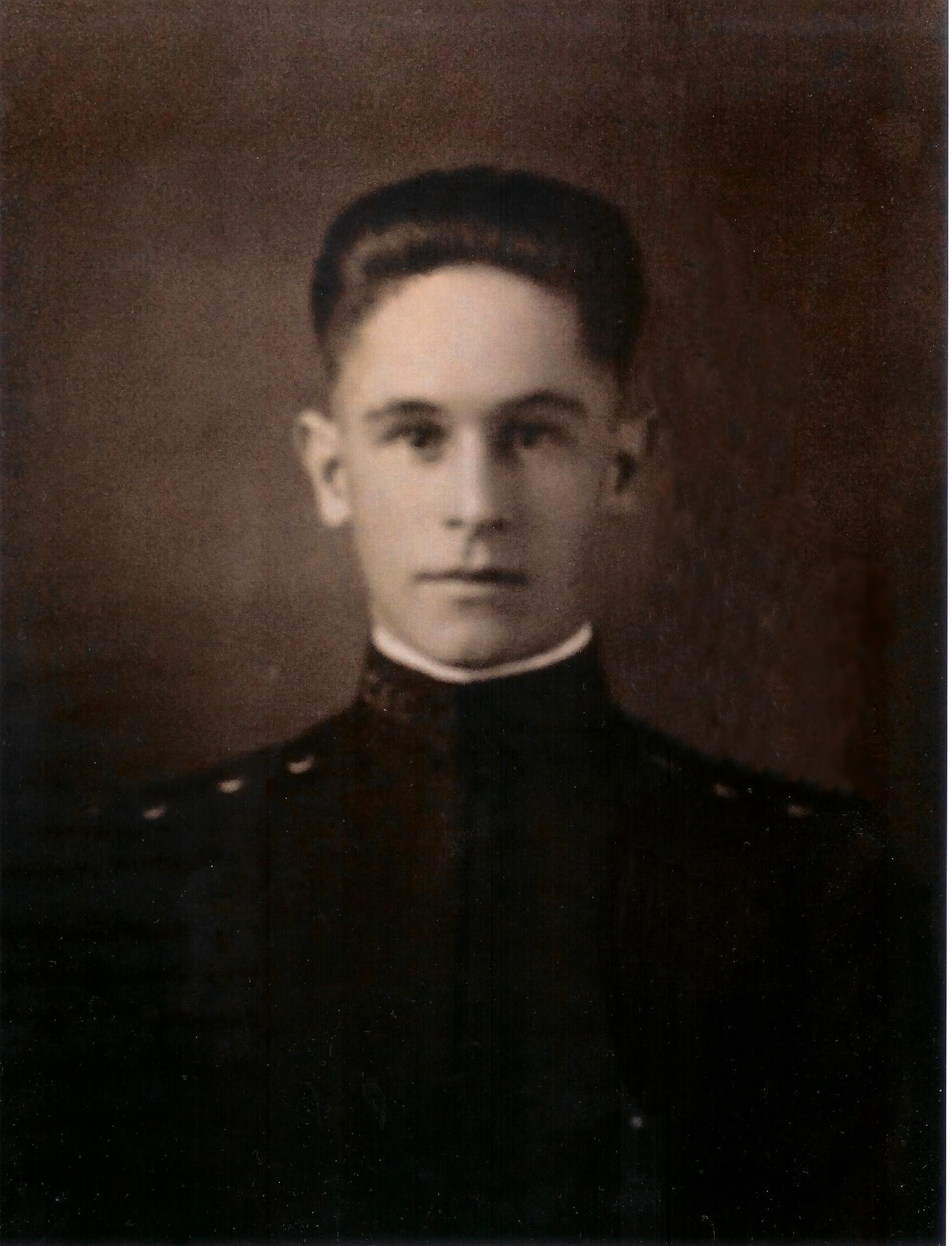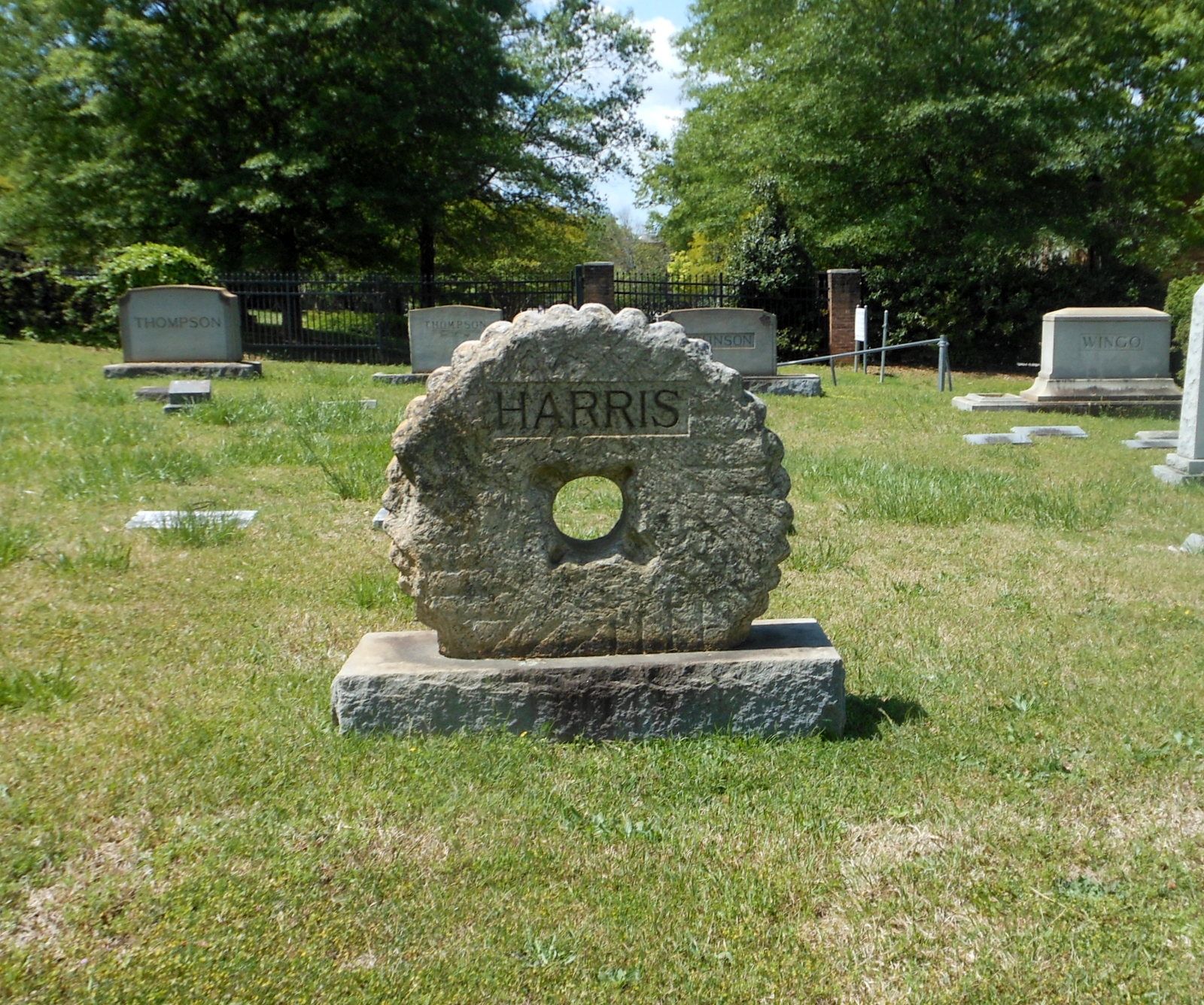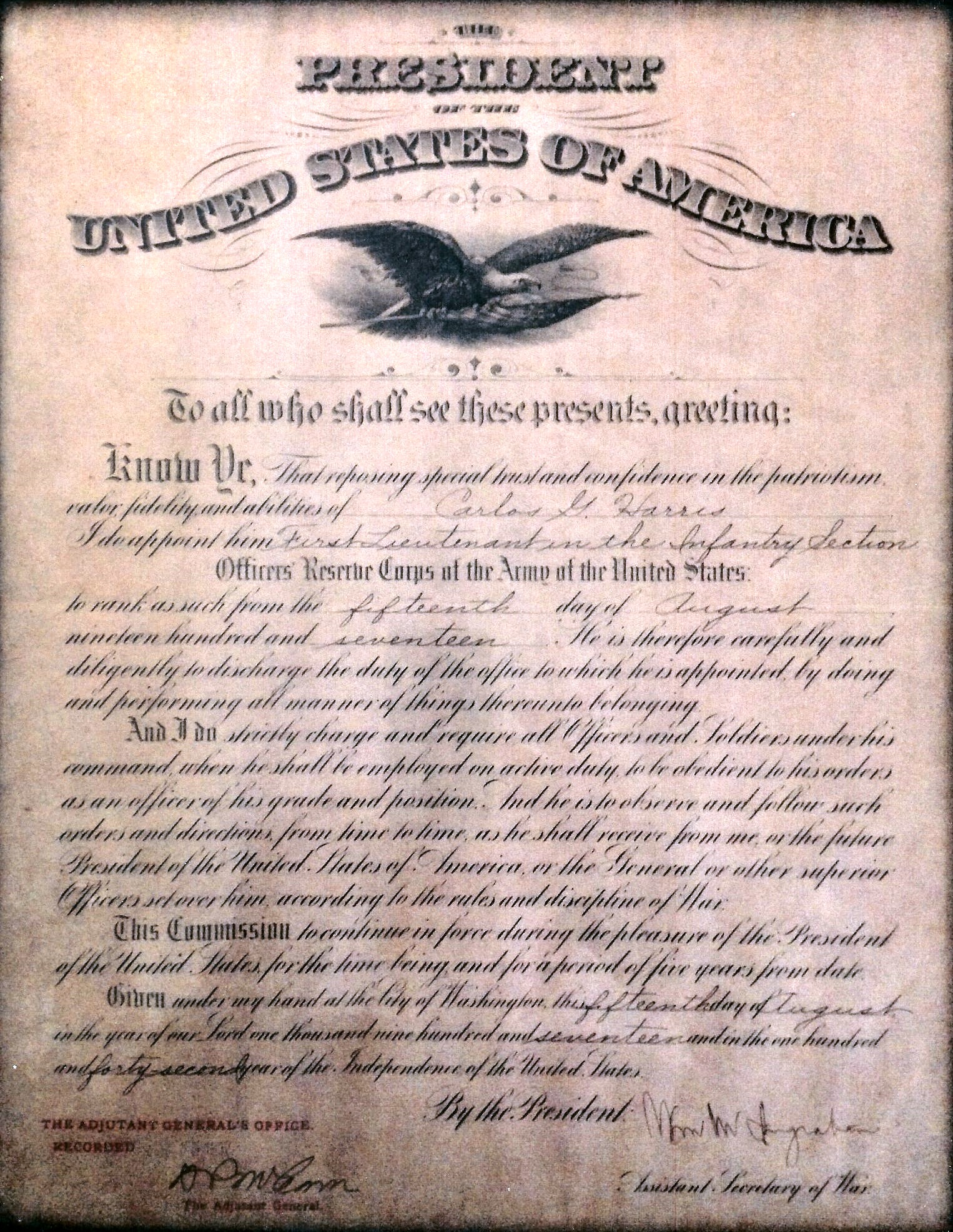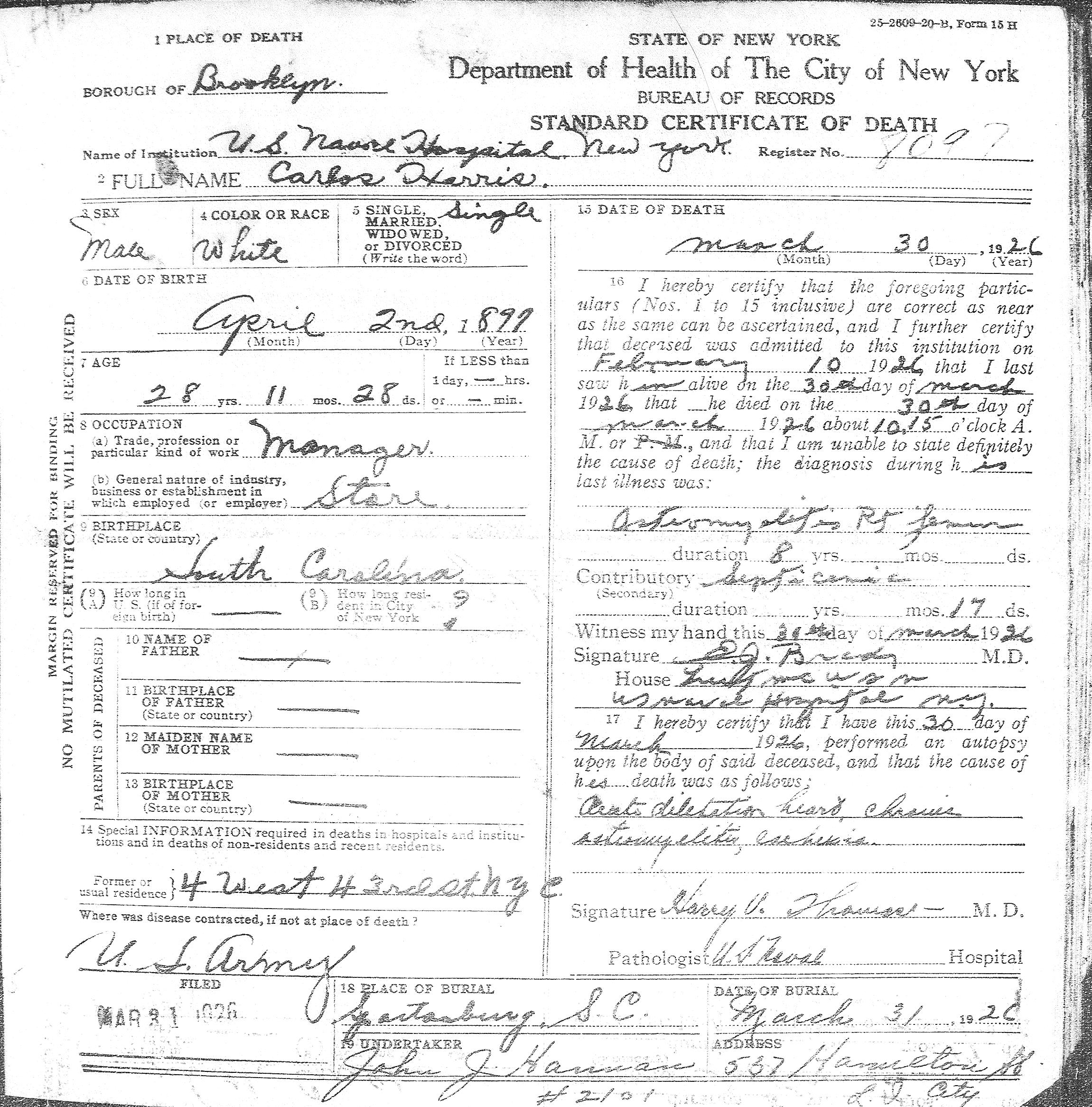In his senior year, Carlos was the editor of the Chronicle, a "student literary magazine", I'm also told by Major Brock M Lusk, a history major & former Iraqi soldier who is doing his Master's thesis on the soldiers from Clemson, that Carlos organized the senior dance that year as a member of the Thalian Club ; Maj Lusk said Clemson sent more soldiers to the "Great War" than the Citadel, the official SC military college. Carlos was also Captain of the basketball team.
Carlos graduated from Clemson in June 1917 and went straight into the military via ROTC along with over 100 of his fellow students, being sent first to Ft. Oglethorpe in Georgia. He was made a 1st Lieutenant (see commission) and in 1918 was sent to France as one of the junior officers of an SC Negro infantry troop. His troop the 371st Infantry was highly successful in the war.
There were several Negro infantry troops training in several places including Camp Wadsworth in Spartanburg County, SC for a short time, but there were tensions between the whites & the Negro soldiers in every southern area they were stationed. In Spartanburg my cousin Edwin said he remembered being told that one day two Negro soldiers got drunk while in town & were put in jail, someone went back to the camp & told them that two soldiers were being beaten up, so the troop headed into town on foot to come to their aid. One soldier ran ahead of them & found that the two soldiers were not being beaten, they were sleeping off the drug in jail, he hurried back to meet the angry troop & told them, stopping what might have become a riot; the troop, who were armed with agricultural implements, turned around & went back to the camp. They were subsequently moved out of the area, no doubt to reduce tensions in this racially segregated area of the South where the Confederacy was still being strongly celebrated. A recent BBC News article about a new graphic novel about the 369th Infantry troop said they were moved around to different training areas in the South & everywhere they went they were spat on & beaten up, but they had great restraint, they never met violence with violence even though they were trained to fight. They were sent to the front too soon where, despite their having less training than the white troops, they earned a reputation as a fierce fighting regiment.
Carlos was a junior officer with the 371st Infantry, on the day he was severely injured in Mothiers, Vogas Sector, France on 28 Sept 1918, his commanding officer came down sick, he put Carlos in charge of the coming battle. My cousin Edwin said he was later told by a fellow soldier & local black friend of Carlos's from Spartanburg that everyone in the troop believed the commanding officer was actually sick from fear. Carlos's troop stormed a hill where the enemy Germans were waiting, unbeknownst to them the German officer had told his men to shoot over the American's heads until they reached a predetermined line, then shoot to kill. Many of the regiment were injured. This greatly angered the troop, and when next they attacked, they took out their anger on the enemy & showed no mercy, they massacred all the Germans, even those who surrendered. During the battle, Carlos was hit with a cannonball in the hip, his local black friend in the troop was nearby, he told Edwin he saw Carlos thrown high into the air & somersaulted, at the time he did not believe anyone could survive such a direct hit.
This may explain why no one brought him medical aid. Carlos told his family how he woke up naked on the quiet battlefield, while he was unconscious, scavengers had taken all his possessions. An ambulance driver eventually came around picking up bodies, Carlos was put on a cot naked in the van underneath a blanket. There are 2 accounts I've been told of what happened on the drive into Paris, the more dramatic account says Carlos was put underneath another man whose blood was dripping on his face. On the way to the city, the driver stopped at a tavern & went inside, leaving his van outside, and he didn't come back. Carlos was cold & hurting, and with blood dripping in his face he got mad. He reached up to the man above him, who was still dressed, took his pistol out of its holster, wrapped his blanket around his body & hobbled inside the tavern. He found the French driver drinking, and when he didn't want to leave Carlos put the gun to his head & said, with a few choice cuss words, he'd better get him to the hospital or his own brains would be splattered on the bar. The French driver understood, quickly got back inside & drove them to the hospital at breakneck pace. In the 2nd less dramatic account, Carlos was the one on the top bunk & the injured man on the bottom bunk asked Carlos to move because his blood was dripping in his face, but Carlos could not move, & neither could the other man. On the long drive Carlos asked the driver several times to get him something to drink, eventually the driver finally stopped at a tavern & brought him out some unpleasant alcoholic beverage. By the time they got to Paris, the man in the lower bunk was dead. It is possible there are elements of truth in both accounts.
In the Paris hospital during triage, Carlos was very lucky, he got the services of the best orthopedic surgeon in France & perhaps the best in Europe who was going around the triage room looking for patients, he singled Carlos out as his patient.
Carlos was listed as "Missing in Action" for a month. When his family next heard, Carlos was in the Paris hospital with his hip shattered into 5 pieces and lung damage from mustard gas. He was eventually transferred to the Naval hospital in New York and given a titanium hip implant. His sister Mella wrote that when he returned home, she was so glad to have her older brother back, and so proud to be seen with Carlos walking down the street in his uniform & cane. His nephew Edwin said when Carlos was dressing, he saw his hip, he could see the silver titanium implant under the skin.
Carlos eventually studied law in New York at Columbia University along with his brother John and passed the NY bar exam in 1925, but as time went on he wrote home that he was uninspired by each type of law he could have chosen to practice; when he was offered a job to became a department store manager for McClellan's Dept. Store chain, he took it. They sent him to Davenport, Iowa as the store manager and he corresponded regularly with his family. His sister Mella kept all of his letters to her and some that he wrote to other family members. I wonder now if Carlos went so far away from home just a year before he died because he realized there was no hope for him & he wanted to spare his family watching him deteriorate, he had written one six-page letter to his father talking about many things and only mentioned in one sentence that there was infection developing in his femur.
I asked Mella once if Carlos ever married, she said no; she told me Carlos and a nurse had fallen in love in New York but he decided not to marry her because of his physical health; he did not believe he could provide for a wife & children. In one of his last letters to Mella, he mentioned a former girlfriend in his hometown but I think he was answering a question she asked him, she had told me he had left a girl here when he went to college and she waited for him, but he was not serious about her. Carlos's letters to his mother & sister were full of chatty talk & asking about beloved relatives, but in his letters to his father he was more blunt about his injuries; in one letter from 13 Feb 1922 the doctor at the military hospital had persuaded him to get a new x-ray which showed chronic infection eating away the inside of the bone, the doctor wanted the bone to be "broken open & go in & burn out the bone in the hip & down the femur" but as far as I know Carlos did not let him. They had no antibiotics then, only opium & morphine for pain.
Carlos never recovered from the injuries he received on that battlefield, he walked with a cane & was in constant pain; Mella also said his lungs did not recover completely from the mustard gas. The operation the doctor advised in 1922 may have prolonged his life but he waited too late, when he finally returned to the New York Naval hospital in February 1926, he was too weak from the infection having spread throughout his body; he became steadily worse & died from septicemia the day after his operation with his brother John beside him. John brought his body back to Spartanburg on the train.
According to his nephew Edwin Foster, so many people attended Carlos's funeral at the First Baptist Church in Spartanburg that the Main Street had to be cordoned off by the police for several blocks. He was buried a few blocks away in his parents' West Oakwood Cemetery plot.
His mother Hattie received a war pension of $15/month based on his service.
--Jeni 7/2014
In his senior year, Carlos was the editor of the Chronicle, a "student literary magazine", I'm also told by Major Brock M Lusk, a history major & former Iraqi soldier who is doing his Master's thesis on the soldiers from Clemson, that Carlos organized the senior dance that year as a member of the Thalian Club ; Maj Lusk said Clemson sent more soldiers to the "Great War" than the Citadel, the official SC military college. Carlos was also Captain of the basketball team.
Carlos graduated from Clemson in June 1917 and went straight into the military via ROTC along with over 100 of his fellow students, being sent first to Ft. Oglethorpe in Georgia. He was made a 1st Lieutenant (see commission) and in 1918 was sent to France as one of the junior officers of an SC Negro infantry troop. His troop the 371st Infantry was highly successful in the war.
There were several Negro infantry troops training in several places including Camp Wadsworth in Spartanburg County, SC for a short time, but there were tensions between the whites & the Negro soldiers in every southern area they were stationed. In Spartanburg my cousin Edwin said he remembered being told that one day two Negro soldiers got drunk while in town & were put in jail, someone went back to the camp & told them that two soldiers were being beaten up, so the troop headed into town on foot to come to their aid. One soldier ran ahead of them & found that the two soldiers were not being beaten, they were sleeping off the drug in jail, he hurried back to meet the angry troop & told them, stopping what might have become a riot; the troop, who were armed with agricultural implements, turned around & went back to the camp. They were subsequently moved out of the area, no doubt to reduce tensions in this racially segregated area of the South where the Confederacy was still being strongly celebrated. A recent BBC News article about a new graphic novel about the 369th Infantry troop said they were moved around to different training areas in the South & everywhere they went they were spat on & beaten up, but they had great restraint, they never met violence with violence even though they were trained to fight. They were sent to the front too soon where, despite their having less training than the white troops, they earned a reputation as a fierce fighting regiment.
Carlos was a junior officer with the 371st Infantry, on the day he was severely injured in Mothiers, Vogas Sector, France on 28 Sept 1918, his commanding officer came down sick, he put Carlos in charge of the coming battle. My cousin Edwin said he was later told by a fellow soldier & local black friend of Carlos's from Spartanburg that everyone in the troop believed the commanding officer was actually sick from fear. Carlos's troop stormed a hill where the enemy Germans were waiting, unbeknownst to them the German officer had told his men to shoot over the American's heads until they reached a predetermined line, then shoot to kill. Many of the regiment were injured. This greatly angered the troop, and when next they attacked, they took out their anger on the enemy & showed no mercy, they massacred all the Germans, even those who surrendered. During the battle, Carlos was hit with a cannonball in the hip, his local black friend in the troop was nearby, he told Edwin he saw Carlos thrown high into the air & somersaulted, at the time he did not believe anyone could survive such a direct hit.
This may explain why no one brought him medical aid. Carlos told his family how he woke up naked on the quiet battlefield, while he was unconscious, scavengers had taken all his possessions. An ambulance driver eventually came around picking up bodies, Carlos was put on a cot naked in the van underneath a blanket. There are 2 accounts I've been told of what happened on the drive into Paris, the more dramatic account says Carlos was put underneath another man whose blood was dripping on his face. On the way to the city, the driver stopped at a tavern & went inside, leaving his van outside, and he didn't come back. Carlos was cold & hurting, and with blood dripping in his face he got mad. He reached up to the man above him, who was still dressed, took his pistol out of its holster, wrapped his blanket around his body & hobbled inside the tavern. He found the French driver drinking, and when he didn't want to leave Carlos put the gun to his head & said, with a few choice cuss words, he'd better get him to the hospital or his own brains would be splattered on the bar. The French driver understood, quickly got back inside & drove them to the hospital at breakneck pace. In the 2nd less dramatic account, Carlos was the one on the top bunk & the injured man on the bottom bunk asked Carlos to move because his blood was dripping in his face, but Carlos could not move, & neither could the other man. On the long drive Carlos asked the driver several times to get him something to drink, eventually the driver finally stopped at a tavern & brought him out some unpleasant alcoholic beverage. By the time they got to Paris, the man in the lower bunk was dead. It is possible there are elements of truth in both accounts.
In the Paris hospital during triage, Carlos was very lucky, he got the services of the best orthopedic surgeon in France & perhaps the best in Europe who was going around the triage room looking for patients, he singled Carlos out as his patient.
Carlos was listed as "Missing in Action" for a month. When his family next heard, Carlos was in the Paris hospital with his hip shattered into 5 pieces and lung damage from mustard gas. He was eventually transferred to the Naval hospital in New York and given a titanium hip implant. His sister Mella wrote that when he returned home, she was so glad to have her older brother back, and so proud to be seen with Carlos walking down the street in his uniform & cane. His nephew Edwin said when Carlos was dressing, he saw his hip, he could see the silver titanium implant under the skin.
Carlos eventually studied law in New York at Columbia University along with his brother John and passed the NY bar exam in 1925, but as time went on he wrote home that he was uninspired by each type of law he could have chosen to practice; when he was offered a job to became a department store manager for McClellan's Dept. Store chain, he took it. They sent him to Davenport, Iowa as the store manager and he corresponded regularly with his family. His sister Mella kept all of his letters to her and some that he wrote to other family members. I wonder now if Carlos went so far away from home just a year before he died because he realized there was no hope for him & he wanted to spare his family watching him deteriorate, he had written one six-page letter to his father talking about many things and only mentioned in one sentence that there was infection developing in his femur.
I asked Mella once if Carlos ever married, she said no; she told me Carlos and a nurse had fallen in love in New York but he decided not to marry her because of his physical health; he did not believe he could provide for a wife & children. In one of his last letters to Mella, he mentioned a former girlfriend in his hometown but I think he was answering a question she asked him, she had told me he had left a girl here when he went to college and she waited for him, but he was not serious about her. Carlos's letters to his mother & sister were full of chatty talk & asking about beloved relatives, but in his letters to his father he was more blunt about his injuries; in one letter from 13 Feb 1922 the doctor at the military hospital had persuaded him to get a new x-ray which showed chronic infection eating away the inside of the bone, the doctor wanted the bone to be "broken open & go in & burn out the bone in the hip & down the femur" but as far as I know Carlos did not let him. They had no antibiotics then, only opium & morphine for pain.
Carlos never recovered from the injuries he received on that battlefield, he walked with a cane & was in constant pain; Mella also said his lungs did not recover completely from the mustard gas. The operation the doctor advised in 1922 may have prolonged his life but he waited too late, when he finally returned to the New York Naval hospital in February 1926, he was too weak from the infection having spread throughout his body; he became steadily worse & died from septicemia the day after his operation with his brother John beside him. John brought his body back to Spartanburg on the train.
According to his nephew Edwin Foster, so many people attended Carlos's funeral at the First Baptist Church in Spartanburg that the Main Street had to be cordoned off by the police for several blocks. He was buried a few blocks away in his parents' West Oakwood Cemetery plot.
His mother Hattie received a war pension of $15/month based on his service.
--Jeni 7/2014
Family Members
-
![]()
Amos Lyles "Liles" Harris
1887–1956
-
![]()
Landon Miles Harris
1888–1890
-
![]()
Frederick Gentry Harris
1890–1935
-
![]()
Julia Anna Harris Foster
1892–1978
-
![]()
Hattie Weste Harris Anderson
1894–1972
-
![]()
Dr John Weste Harris Jr
1895–1976
-
Emily Jane Harris Patton
1898–1985
-
![]()
Joe Elmo Harris
1900–1964
-
![]()
Mary Ella "Mella" Harris
1902–1982
Sponsored by Ancestry
Advertisement
Explore more
Sponsored by Ancestry
Advertisement

















